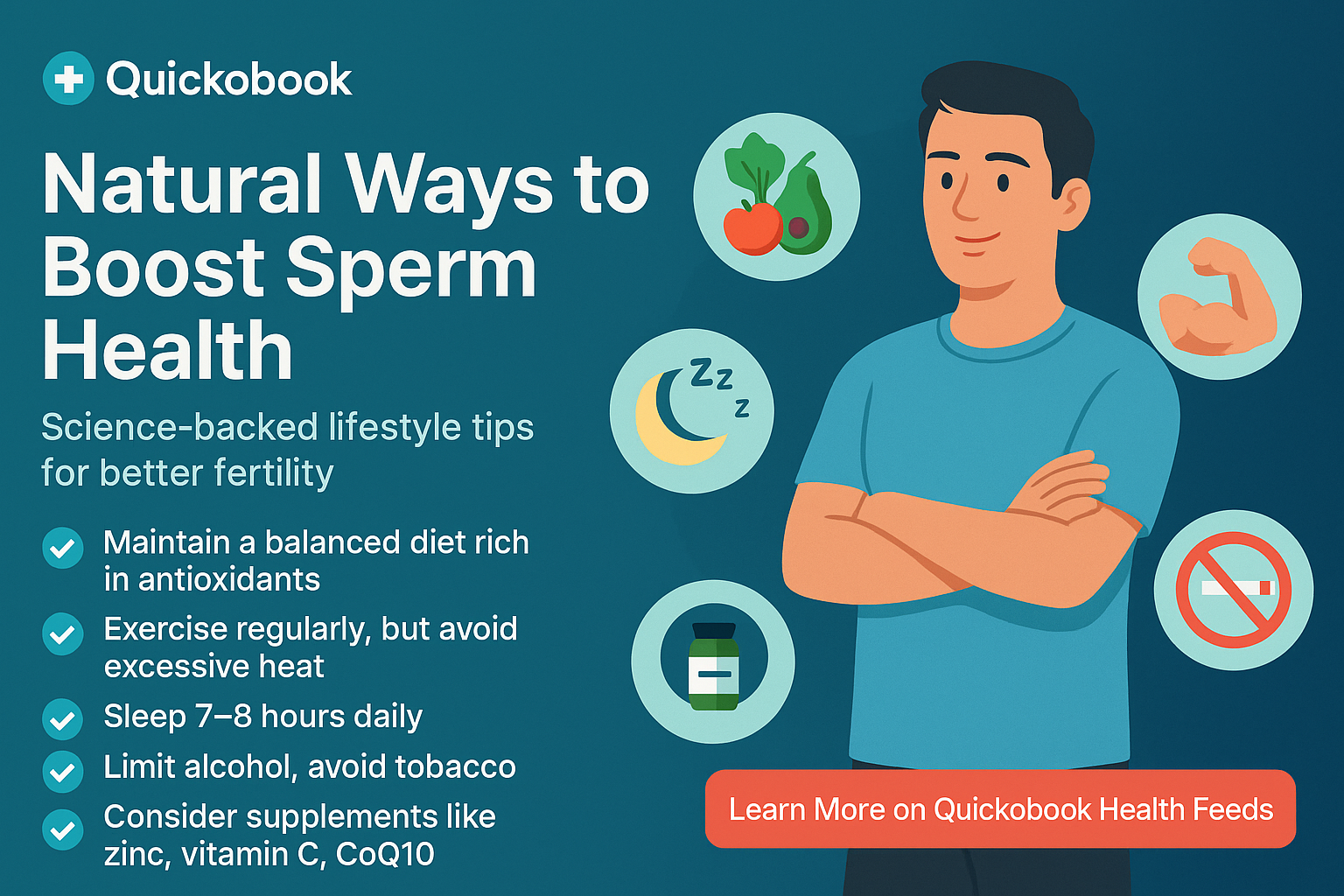Introduction
Male fertility is an important but often overlooked aspect of reproductive health. In India, many couples struggle with infertility, and in about 40–50% of cases, the issue is linked to low sperm count or poor sperm quality. Fortunately, there are natural ways to improve sperm health through diet, exercise, stress management, and lifestyle modifications.
This blog explains:
- What affects sperm health
- Natural ways to increase sperm count and motility
- Foods and vitamins that help
- Ayurvedic remedies and lifestyle practices
- When to see a doctor
- How Quickobook can help you book a sperm count test conveniently
What is Sperm Count and Why Does It Matter?
- Sperm count: The number of sperm present in 1 millilitre of semen.
- Normal sperm count: 15 million or more per ml (as per WHO guidelines).
- Low sperm count (Oligospermia): Less than 15 million per ml.
- Zero sperm count (Azoospermia): No sperm in semen.
A healthy sperm count improves the chances of natural conception. But it is not just about numbers—sperm motility (movement) and morphology (shape) also play a crucial role.
Causes of Low Sperm Count
- Lifestyle factors – Smoking, alcohol, drug use.
- Obesity – Excess fat disrupts hormone balance.
- Heat exposure – Tight underwear, laptops on lap, hot baths.
- Stress – High cortisol lowers testosterone.
- Nutritional deficiencies – Lack of zinc, vitamin C, vitamin D, omega-3.
- Medical conditions – Varicocele, hormonal imbalance, diabetes.
- Environmental toxins – Pesticides, heavy metals, plastic chemicals.
Natural Ways to Boost Sperm Quality and Count
1. Eat a Fertility-Friendly Diet
- Zinc-rich foods: Pumpkin seeds, lentils, chickpeas.
- Vitamin C & E foods: Oranges, amla, almonds, sunflower seeds.
- Omega-3 fatty acids: Fish, walnuts, flaxseeds.
- Leafy greens: Spinach, kale (folate-rich).
- Protein sources: Eggs, lean chicken, paneer.
2. Exercise Regularly
- Moderate exercise (walking, yoga, strength training) boosts testosterone.
- Avoid over-exercising, as extreme workouts can reduce fertility.
3. Maintain a Healthy Weight
- Obesity is linked to lower testosterone and poor sperm quality.
- Losing even 5–10% body weight can improve fertility markers.
4. Reduce Stress
- Yoga, meditation, pranayama.
- Adequate sleep (7–8 hours daily).
- Stress-free lifestyle improves hormone balance.
READ ALSO: Sexually Transmitted Infections (stis) Vs. Stds – Differences And Prevention
5. Quit Smoking, Limit Alcohol
- Smoking damages DNA in sperm.
- Alcohol lowers testosterone and sperm production.
6. Protect Testicular Health
- Avoid tight underwear; wear breathable cotton.
- Keep laptops away from lap.
- Avoid hot water baths/saunas.
7. Vitamins and Supplements
- Zinc – Essential for sperm production.
- Vitamin D – Supports testosterone.
- Vitamin C – Protects sperm from oxidative stress.
- Coenzyme Q10 – Boosts motility.
- Ashwagandha (Ayurvedic herb) – Improves sperm quality.
8. Ayurvedic Remedies
- Ashwagandha – Increases sperm concentration.
- Shilajit – Improves testosterone.
- Safed Musli – Enhances vitality.
- Gokshura (Tribulus Terrestris) – Improves libido and sperm count.
(Note: Always consult an Ayurvedic doctor before starting any supplement.)
When to See a Doctor
- If you’ve been trying to conceive for 12+ months without success.
- If sperm count test shows low sperm levels.
- If you have history of testicular injury, surgery, or hormonal issues.
- If you experience erectile dysfunction or reduced sexual desire.
Risks and Complications of Untreated Low Sperm Count
- Emotional stress, anxiety, depression.
- Relationship strain.
- Delayed or failed conception.
- Possible underlying medical condition (like varicocele or hormonal disorder).
Book Sperm Count Test with Quickobook
Early diagnosis is the key. Quickobook makes it simple:
- Search for sperm count test in your city.
- Book appointments online.
- Get access to certified labs and doctors.
- Affordable pricing with transparent costs in INR.
- Saves time with confirmed slots.
Take charge of your fertility today. [Book Test sperm count with Quickobook]
50 FAQs on Sperm Count and Male Fertility
Q1. What is a normal sperm count?
A normal sperm count is 15 million or more sperm per ml of semen.
Q2. Can low sperm count be treated naturally?
Yes, lifestyle changes, diet, and stress management often help.
Q3. Does age affect sperm quality?
Yes, sperm motility and DNA quality decline with age, especially after 40.
Q4. Can exercise increase sperm count?
Moderate exercise improves testosterone and fertility health.
Q5. Does smoking reduce sperm count?
Yes, smoking damages sperm DNA and lowers motility.
Q6. Is alcohol bad for sperm quality?
Excess alcohol lowers testosterone and sperm production.
Q7. Can stress affect fertility?
Yes, high stress raises cortisol, reducing testosterone.
Q8. What foods increase sperm count?
Pumpkin seeds, walnuts, citrus fruits, spinach, and eggs.
Q9. Can obesity reduce sperm health?
Yes, obesity disrupts hormone balance and sperm production.
Q10. How much sleep is needed for fertility?
7–8 hours of sleep supports hormone regulation.
Q11. Can hot baths affect sperm count?
Yes, heat lowers sperm production.
Q12. Is laptop use harmful for sperm?
Yes, heat from laptops on lap can reduce sperm quality.
Q13. Does tight underwear affect sperm?
Yes, it increases heat around testes, reducing sperm count.
Q14. What vitamins improve sperm?
Zinc, Vitamin C, Vitamin D, and Coenzyme Q10.
Q15. Does ashwagandha improve fertility?
Yes, it helps increase sperm concentration naturally.
Q16. Can Ayurveda cure low sperm count?
It can support fertility, but consult an Ayurvedic doctor.
Q17. How long does it take to improve sperm count?
About 3 months of lifestyle changes may show results.
Q18. Can dehydration reduce sperm count?
Yes, hydration is important for semen volume.
Q19. Do energy drinks affect sperm?
Excess caffeine and sugar may lower fertility.
Q20. Can cycling affect fertility?
Long hours of cycling may put pressure on testes.
Q21. Does diabetes affect sperm count?
Yes, uncontrolled diabetes impacts fertility.
Q22. Can varicocele cause infertility?
Yes, it is a common cause of low sperm count.
Q23. Is infertility always permanent?
No, many men improve with treatment and lifestyle.
Q24. Do mobile phones affect sperm?
Excess radiation near testes may lower sperm quality.
Q25. Can certain medicines affect sperm count?
Yes, chemotherapy and steroids can harm fertility.
Q26. Is semen analysis painful?
No, it is a simple and painless test.
Q27. How often should men do a sperm test?
If facing infertility, once every 6–12 months.
Q28. Can yoga help fertility?
Yes, yoga reduces stress and improves hormone balance.
Q29. Does alcohol in moderation affect sperm?
Small amounts may not, but excess is harmful.
Q30. Can vitamin D deficiency cause infertility?
Yes, it lowers testosterone and sperm production.
Q31. Does eating junk food affect sperm count?
Yes, trans fats and processed foods reduce fertility.
Q32. Can smoking marijuana affect sperm?
Yes, it reduces sperm motility and count.
Q33. Does testosterone therapy improve fertility?
No, external testosterone may reduce sperm production.
Q34. Can exercise supplements harm sperm?
Yes, anabolic steroids negatively impact fertility.
Q35. Does fasting affect sperm count?
Short fasting may not, but poor nutrition does.
Q36. Can thyroid problems affect sperm?
Yes, both hypo- and hyperthyroidism impact fertility.
Q37. Does low sperm count mean zero chance of fatherhood?
No, many men with low sperm count still conceive.
Q38. Is infertility only a female problem?
No, men account for 40–50% of infertility cases.
Q39. Can supplements alone cure infertility?
No, they support but do not replace medical advice.
Q40. Do antioxidants help sperm?
Yes, they reduce oxidative stress on sperm.
Q41. Can exercise every day boost sperm count?
Yes, moderate daily activity helps.
Q42. Does mobile radiation always reduce fertility?
No, but long exposure near testes may harm.
Q43. Can depression affect fertility?
Yes, it affects hormone levels and desire.
Q44. Is infertility common in India?
Yes, about 10–15% couples face infertility issues.
Q45. Can IVF help men with low sperm count?
Yes, assisted reproductive techniques are effective.
Q46. Does semen color show fertility status?
Not always, only lab tests confirm fertility.
Q47. Can high fever affect sperm?
Yes, temporary sperm reduction occurs after fever.
Q48. Does stress at work reduce sperm quality?
Yes, chronic stress lowers testosterone.
Q49. Can a sperm test detect all fertility issues?
It shows sperm health but not all causes.
Q50. How to book a sperm count test in India?
Easily book with Quickobook for certified labs and doctors.
Conclusion
Improving sperm quality and count naturally is possible with the right lifestyle, nutrition, and holistic care. Small daily changes—like eating a fertility-friendly diet, managing stress, and avoiding smoking—can bring big improvements. But remember, if you face persistent fertility issues, consult a doctor and get tested. Quickobook helps you easily book sperm count tests and connect with fertility experts near you.
Your journey to fatherhood can start with one step today.
Disclaimer
This article is for educational purposes only. It is not a substitute for medical advice. Always consult a qualified doctor before starting any treatment, supplement, or lifestyle change related to fertility.









Comments (0)
No comments yet. Be the first to share your thoughts!
Leave a Comment